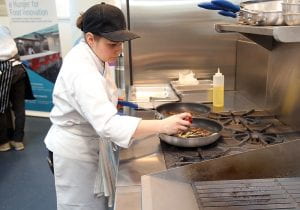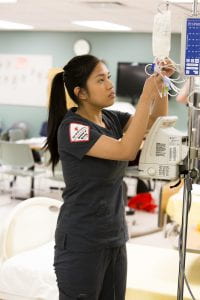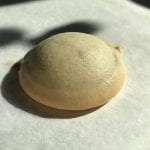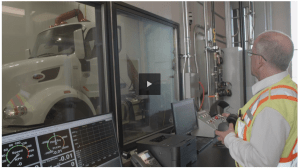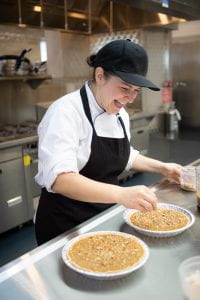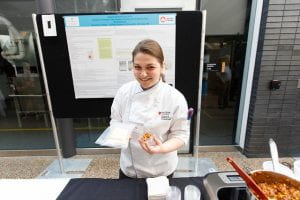Bump gets a boost from newfound home cooks
The rise in home cooking has been hard to miss these past few weeks. Log on to Instagram and you’re likely to scroll through endless images of freshly baked bread, elaborate home-cooked meals, and exquisite desserts. With so many of us staying home, there’s more time to test out recipes and ingredients that were once too intimidating to try.
In the midst of the novel coronavirus pandemic, Winnipeg-based food entrepreneur James Battershill was set to launch a new consumer product. Bump Beef + Plant Blend hit the shelves in mid-March – just as Winnipeg’s first cases of COVID-19 were confirmed.
Not ideal timing, to be sure, but many Winnipeg households now found themselves with a heaping serving of spare time and a dash of curiosity – which made for the winning, if unorthodox, setting for a new product to launch.
“When we first saw the changes that came with the outbreak, we were seeing a lot of people cooking at home and people making their own lunches,” says Battershill. “We were expecting people to make comfort food – ground-beef based food.”
Bump is comfort food, with a twist. The product is geared towards the flexitarian market: people who are looking for alternate forms of protein without cutting meat from their diets altogether. The 70-30 ground beef/plant-based protein blend is the result of nearly two years of product development and experimentation.
While Battershill’s original plan of an aggressive in-store sampling program had to be shelved, the product is still currently available in Vita Health stores across the city. And has proven to be very popular.
“Sales at Vita Health are strong,” says Battershill. “It shows that people want to try something new.”
Juno Food Labs, the company behind Bump, has also started local delivery throughout Winnipeg to meet the demand of hungry consumers. And with warmer temperatures on the horizon, Winnipeggers are also itching to get grilling.
“Bump is really great on the grill,” says Battershill. “It’s new and interesting – this will be a new staple to add to the barbecue.”
With extensive work experience in farm-lobbying, Battershill saw there was a gap in the market for a product explicitly designed for the flexitarian consumer. In February 2019, he quit his full-time job to establish Juno Food Labs and focus fully on Bump.
“Most products were entirely plant-based and aimed at vegetarians and vegans,” he says. “There was nothing specifically for people who still eat meat.”
Bump started where many food start-ups do: in the home kitchen. Battershill experimented to see how plant proteins and meats work together, initially using family and friends to taste-test the results. With positive feedback across the board, he approached Red River College’s Prairie Research Kitchen team in November 2018 to undertake an applied research project to determine the optimal product formulation.
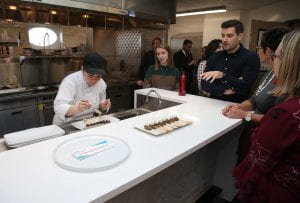
James Battershill (at right, speaking) and Anna Borys (preparing Bump kofta) at the Prairie Research Kitchen grand opening
The Prairie Research Kitchen team has a blended background of food science and research, which made them the perfect team to bring Bump to the next level. The initial project involved ingredient selection, hydration, and ratio refinement of animal to plant proteins.
Prairie Research Kitchen research manager Heather Hill designed an extensive series of trials to determine the ideal ingredients and blending process. The project also integrated culinary students through recipe development to determine the functionality and flavour of the final Bump formulation.
“It was a surprisingly complex project considering the ingredient varieties and processing options,” Hill reports. “Our team did a thorough investigation to ensure the two protein sources blended consistently to meet consumer expectations when compared to pure ground beef.”
The resulting product performed well in production and sensory trials. The students initially developed four recipes to test taste and functionality, including a tasty Bump kofta kebab created by former co-op student and current research assistant, Anna Borys (see recipe below).
“It was a really positive experience,” says Battershill. “The Culinary Research team took the product from an idea to something that was refined and ready for commercialization.”
While the new shift in daily routine can’t be ignored, Battershill notes that the current stay-home measures haven’t affected Juno Food Labs too much.
“Our team has always worked remotely, only now we have a more limited number of taste testers when we’re working on new recipes!” he says with a laugh.
For more information and recipes, visit eatbump.com.
Read more on Battershill’s work at the Prairie Research Kitchen in the Winnipeg Free Press.
 Bump Beef + Plant Kofta Recipe
Bump Beef + Plant Kofta Recipe
by Chef Anna Borys
Ingredients:
- 1 lb Bump
- 1 tbsp garlic, minced
- 2 tsp Kosher Salt
- 1/4 cup onion, grated
- 1/4 cup parsley, finely chopped
- 1 tsp coriander, ground
- 1/4 tsp cinnamon, ground
- 1/4 tsp allspice, ground
- 1/8 tsp cayenne, ground
- 1/8 tsp ginger, ground
- 1/4 tsp black pepper, ground
- 1 egg, beaten
- 1/2 cup of panko (or gluten-free) breadcrumbs
Directions:
- In a large mixing bowl, combine all ingredients.
- Using clean hands (and gloves if you prefer), mix well. Ensure the spices are well distributed.
- Cover and refrigerate for minimum 20 minutes (or up to one day).
- Divide the meat into six-eight equal-sized portions. Form meat mixture portions into logs or pucks. You can form them on metal or soaked bamboo skewers.
- Grill on high heat or fry on medium high for 12-15 minutes or until internal temperature reaches 74ºC (165ºF).
- Let rest for five minutes before serving.
Note: Serve with a variety of sides such a pita, tzatziki sauce, hummus, Greek salad, tabbouleh or couscous.
You can find the full video of the method up on RRC’s Instagram. Follow along and post your own recipes! Tag us @redrivercollege and use the hashtag #RRChomechef.


